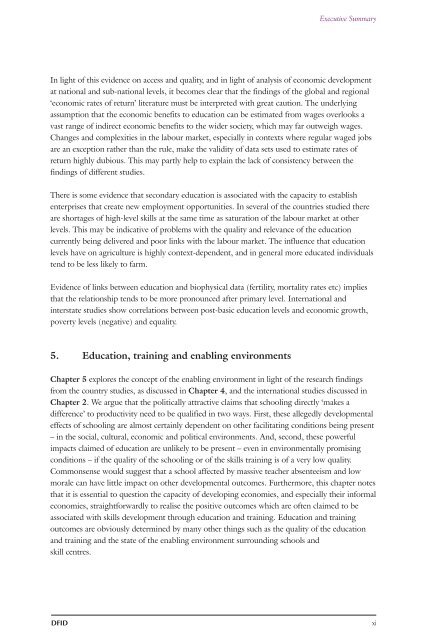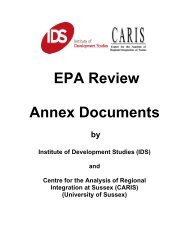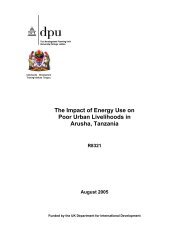Educating out of Poverty? A Synthesis Report on Ghana, India ... - DfID
Educating out of Poverty? A Synthesis Report on Ghana, India ... - DfID
Educating out of Poverty? A Synthesis Report on Ghana, India ... - DfID
You also want an ePaper? Increase the reach of your titles
YUMPU automatically turns print PDFs into web optimized ePapers that Google loves.
Executive Summary<br />
In light <str<strong>on</strong>g>of</str<strong>on</strong>g> this evidence <strong>on</strong> access and quality, and in light <str<strong>on</strong>g>of</str<strong>on</strong>g> analysis <str<strong>on</strong>g>of</str<strong>on</strong>g> ec<strong>on</strong>omic development<br />
at nati<strong>on</strong>al and sub-nati<strong>on</strong>al levels, it becomes clear that the findings <str<strong>on</strong>g>of</str<strong>on</strong>g> the global and regi<strong>on</strong>al<br />
‘ec<strong>on</strong>omic rates <str<strong>on</strong>g>of</str<strong>on</strong>g> return’ literature must be interpreted with great cauti<strong>on</strong>. The underlying<br />
assumpti<strong>on</strong> that the ec<strong>on</strong>omic benefits to educati<strong>on</strong> can be estimated from wages overlooks a<br />
vast range <str<strong>on</strong>g>of</str<strong>on</strong>g> indirect ec<strong>on</strong>omic benefits to the wider society, which may far <str<strong>on</strong>g>out</str<strong>on</strong>g>weigh wages.<br />
Changes and complexities in the labour market, especially in c<strong>on</strong>texts where regular waged jobs<br />
are an excepti<strong>on</strong> rather than the rule, make the validity <str<strong>on</strong>g>of</str<strong>on</strong>g> data sets used to estimate rates <str<strong>on</strong>g>of</str<strong>on</strong>g><br />
return highly dubious. This may partly help to explain the lack <str<strong>on</strong>g>of</str<strong>on</strong>g> c<strong>on</strong>sistency between the<br />
findings <str<strong>on</strong>g>of</str<strong>on</strong>g> different studies.<br />
There is some evidence that sec<strong>on</strong>dary educati<strong>on</strong> is associated with the capacity to establish<br />
enterprises that create new employment opportunities. In several <str<strong>on</strong>g>of</str<strong>on</strong>g> the countries studied there<br />
are shortages <str<strong>on</strong>g>of</str<strong>on</strong>g> high-level skills at the same time as saturati<strong>on</strong> <str<strong>on</strong>g>of</str<strong>on</strong>g> the labour market at other<br />
levels. This may be indicative <str<strong>on</strong>g>of</str<strong>on</strong>g> problems with the quality and relevance <str<strong>on</strong>g>of</str<strong>on</strong>g> the educati<strong>on</strong><br />
currently being delivered and poor links with the labour market. The influence that educati<strong>on</strong><br />
levels have <strong>on</strong> agriculture is highly c<strong>on</strong>text-dependent, and in general more educated individuals<br />
tend to be less likely to farm.<br />
Evidence <str<strong>on</strong>g>of</str<strong>on</strong>g> links between educati<strong>on</strong> and biophysical data (fertility, mortality rates etc) implies<br />
that the relati<strong>on</strong>ship tends to be more pr<strong>on</strong>ounced after primary level. Internati<strong>on</strong>al and<br />
interstate studies show correlati<strong>on</strong>s between post-basic educati<strong>on</strong> levels and ec<strong>on</strong>omic growth,<br />
poverty levels (negative) and equality.<br />
5. Educati<strong>on</strong>, training and enabling envir<strong>on</strong>ments<br />
Chapter 5 explores the c<strong>on</strong>cept <str<strong>on</strong>g>of</str<strong>on</strong>g> the enabling envir<strong>on</strong>ment in light <str<strong>on</strong>g>of</str<strong>on</strong>g> the research findings<br />
from the country studies, as discussed in Chapter 4, and the internati<strong>on</strong>al studies discussed in<br />
Chapter 2. We argue that the politically attractive claims that schooling directly ‘makes a<br />
difference’ to productivity need to be qualified in two ways. First, these allegedly developmental<br />
effects <str<strong>on</strong>g>of</str<strong>on</strong>g> schooling are almost certainly dependent <strong>on</strong> other facilitating c<strong>on</strong>diti<strong>on</strong>s being present<br />
– in the social, cultural, ec<strong>on</strong>omic and political envir<strong>on</strong>ments. And, sec<strong>on</strong>d, these powerful<br />
impacts claimed <str<strong>on</strong>g>of</str<strong>on</strong>g> educati<strong>on</strong> are unlikely to be present – even in envir<strong>on</strong>mentally promising<br />
c<strong>on</strong>diti<strong>on</strong>s – if the quality <str<strong>on</strong>g>of</str<strong>on</strong>g> the schooling or <str<strong>on</strong>g>of</str<strong>on</strong>g> the skills training is <str<strong>on</strong>g>of</str<strong>on</strong>g> a very low quality.<br />
Comm<strong>on</strong>sense would suggest that a school affected by massive teacher absenteeism and low<br />
morale can have little impact <strong>on</strong> other developmental <str<strong>on</strong>g>out</str<strong>on</strong>g>comes. Furthermore, this chapter notes<br />
that it is essential to questi<strong>on</strong> the capacity <str<strong>on</strong>g>of</str<strong>on</strong>g> developing ec<strong>on</strong>omies, and especially their informal<br />
ec<strong>on</strong>omies, straightforwardly to realise the positive <str<strong>on</strong>g>out</str<strong>on</strong>g>comes which are <str<strong>on</strong>g>of</str<strong>on</strong>g>ten claimed to be<br />
associated with skills development through educati<strong>on</strong> and training. Educati<strong>on</strong> and training<br />
<str<strong>on</strong>g>out</str<strong>on</strong>g>comes are obviously determined by many other things such as the quality <str<strong>on</strong>g>of</str<strong>on</strong>g> the educati<strong>on</strong><br />
and training and the state <str<strong>on</strong>g>of</str<strong>on</strong>g> the enabling envir<strong>on</strong>ment surrounding schools and<br />
skill centres.<br />
DFID xi

















